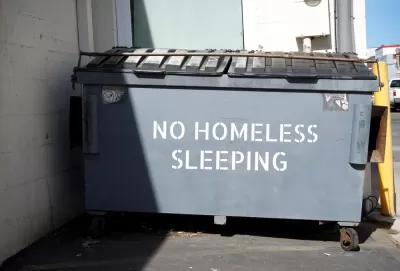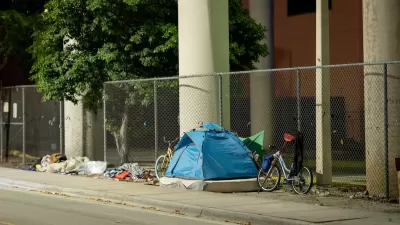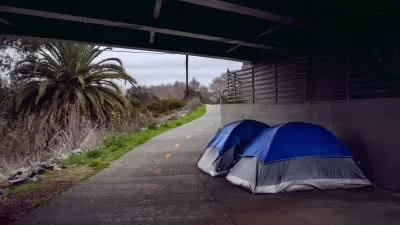Portland’s ‘aggressive’ new camping ban could threaten the city’s most stable community of unhoused people, the two-decade old, self-governing Dignity Village.

An article by Roshan Abraham in Next City describes the self-governed, city-sanctioned Portland community of Dignity Village, a village that was created more than twenty years ago in response to a growing homelessness crisis.
The article outlines the history of the village and the ways that it has remained resilient for so long. “A crucial aspect of the village model is that residents have agency, Ferry says. The spaces are voluntary; residents can leave and there are few barriers to entry. It is hard to imagine any of these approaches being replicated in the planned 6 mega encampments the city is looking to build.” According to Abraham, “Residents in Dignity Village pay $75 a month to live there and put in 10 hours a week of work on village business, which includes cleaning, maintenance and paperwork.” The village is not focused on rehousing, but provides a safe, organized space for people with few other options.
Now, the village’s future is threatened by an aggressive new anti-homelessness policy passed by the city earlier this month. “By forcing people off of the streets, the plan could mean the village, which currently has a modest waitlist of three people, could be overwhelmed with requests. It could also lead many of the city’s unsheltered population to be jailed, forced into congregate shelter or driven away from the city.”
FULL STORY: In Portland’s Self-Governed Dignity Village, The Unhoused Make Their Own Rules

Alabama: Trump Terminates Settlements for Black Communities Harmed By Raw Sewage
Trump deemed the landmark civil rights agreement “illegal DEI and environmental justice policy.”

Planetizen Federal Action Tracker
A weekly monitor of how Trump’s orders and actions are impacting planners and planning in America.

The 120 Year Old Tiny Home Villages That Sheltered San Francisco’s Earthquake Refugees
More than a century ago, San Francisco mobilized to house thousands of residents displaced by the 1906 earthquake. Could their strategy offer a model for the present?

In Both Crashes and Crime, Public Transportation is Far Safer than Driving
Contrary to popular assumptions, public transportation has far lower crash and crime rates than automobile travel. For safer communities, improve and encourage transit travel.

Report: Zoning Reforms Should Complement Nashville’s Ambitious Transit Plan
Without reform, restrictive zoning codes will limit the impact of the city’s planned transit expansion and could exclude some of the residents who depend on transit the most.

Judge Orders Release of Frozen IRA, IIJA Funding
The decision is a victory for environmental groups who charged that freezing funds for critical infrastructure and disaster response programs caused “real and irreparable harm” to communities.
Urban Design for Planners 1: Software Tools
This six-course series explores essential urban design concepts using open source software and equips planners with the tools they need to participate fully in the urban design process.
Planning for Universal Design
Learn the tools for implementing Universal Design in planning regulations.
Jessamine County Fiscal Court
Caltrans
Institute for Housing and Urban Development Studies (IHS)
City of Grandview
Harvard GSD Executive Education
Toledo-Lucas County Plan Commissions
Salt Lake City
NYU Wagner Graduate School of Public Service





























